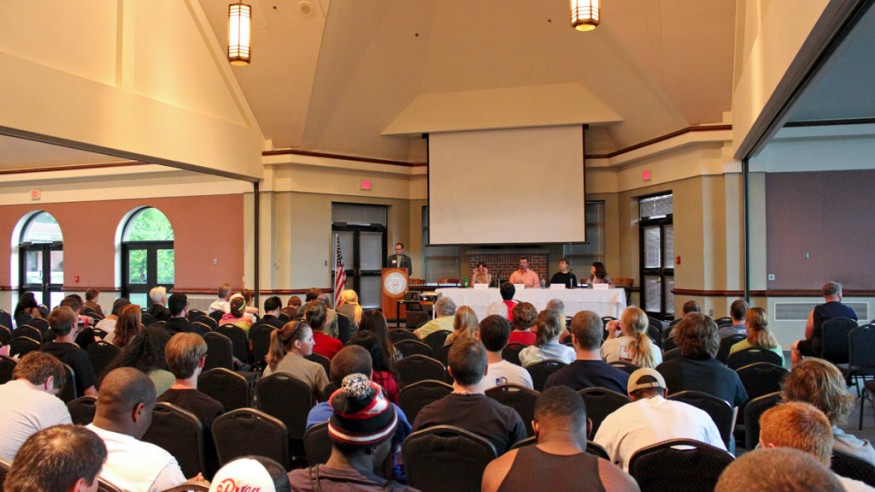
Bite! Panel Discusses Importance of Food
Bite! panelists describe personal food connections. (Photo by Chris Henchey ’14)
How are the fields of Philosophy, Geography, Microbiology, and Anthropology related? Through food, of course. Ohio Wesleyan University’s Sagan National Colloquium Bite! kicked off Thursday, September 13 with a panel discussion exploring the question “Why is Food Important? Food Across the Disciplines at Ohio Wesleyan University.”
The panel included Professors Mary Howard, sociology/anthropology; Shari Stone-Mediatore, philosophy; Chris Wolverton, microbiology; and David Walker, cultural geography.
The discussion commenced with the professors describing their own personal connections to food, including Howard’s childhood adventures on her grandparents’ farm and Walker’s near suspension from elementary school for bringing sardines in his lunchbox. Wolverton watched Chef Tell on television as a child. Stone-Mediatore discussed being a vegetarian before it was trendy, attempting to “live simply so others can simply live.”
The rest of the discussion really illuminated how food is related to each of these fields in sometimes obvious, sometimes not-so-obvious ways. Howard discussed her previous research in childhood malnutrition in Tanzania. Stone-Mediatore discussed the recent development of food philosophy and how the goal of philosophy, “living an examined life,” includes recognizing that we are “bodily beings” and that we are connected with what we eat and where it comes from. Walker explained how cultural geography is all about examining how people interact with nature as societies develop, and Wolverton reminded us that all our nutrients begin in plant development and photosynthesis.
Food covers all facets of our lives as human beings, and because of that it is something we should think about in many different ways. Professor Christopher Fink, chair of the OWU’s Department of Health & Human Kinetics and director of this year’s colloquium, mediated the discussion. He said the point of the discussion was to show how food is a cross disciplinary topic, but also how it “weaves into, through, and across disciplines.” Very in the spirit of the liberal arts.
Fink emphasized that he was most excited about the colloquium as “exposure but also the chance to dig in” to a topic he finds important and interesting. It’s a chance for students to make connections with people and with a topic that is both personal and global.
